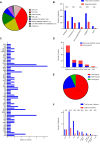Genetic Evaluation of the Patients with Clinically Diagnosed Inborn Errors of Immunity by Whole Exome Sequencing: Results from a Specialized Research Center for Immunodeficiency in Türkiye
- PMID: 38954121
- PMCID: PMC11219406
- DOI: 10.1007/s10875-024-01759-w
Genetic Evaluation of the Patients with Clinically Diagnosed Inborn Errors of Immunity by Whole Exome Sequencing: Results from a Specialized Research Center for Immunodeficiency in Türkiye
Erratum in
-
Correction to: Genetic Evaluation of the Patients with Clinically Diagnosed Inborn Errors of Immunity by Whole Exome Sequencing: Results from a Specialized Research Center for Immunodeficiency in Türkiye.J Clin Immunol. 2024 Nov 14;45(1):41. doi: 10.1007/s10875-024-01841-3. J Clin Immunol. 2024. PMID: 39540960 Free PMC article. No abstract available.
Abstract
Molecular diagnosis of inborn errors of immunity (IEI) plays a critical role in determining patients' long-term prognosis, treatment options, and genetic counseling. Over the past decade, the broader utilization of next-generation sequencing (NGS) techniques in both research and clinical settings has facilitated the evaluation of a significant proportion of patients for gene variants associated with IEI. In addition to its role in diagnosing known gene defects, the application of high-throughput techniques such as targeted, exome, and genome sequencing has led to the identification of novel disease-causing genes. However, the results obtained from these different methods can vary depending on disease phenotypes or patient characteristics. In this study, we conducted whole-exome sequencing (WES) in a sizable cohort of IEI patients, consisting of 303 individuals from 21 different clinical immunology centers in Türkiye. Our analysis resulted in likely genetic diagnoses for 41.1% of the patients (122 out of 297), revealing 52 novel variants and uncovering potential new IEI genes in six patients. The significance of understanding outcomes across various IEI cohorts cannot be overstated, and we believe that our findings will make a valuable contribution to the existing literature and foster collaborative research between clinicians and basic science researchers.
Keywords: Inborn errors of immunity; genetic diagnosis; next generation sequencing; whole exome sequencing.
© 2024. The Author(s).
Conflict of interest statement
The authors declare no competing interests.
Figures


References
-
- Sanal O, Tezcan I. Thirty years of primary immunodeficiencies in Turkey. Ann N Y Acad Sci. 2011;1238:15–23. - PubMed
Publication types
MeSH terms
LinkOut - more resources
Full Text Sources
Miscellaneous

